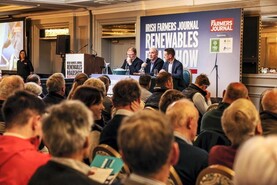An energy shortfall this coming winter is a distinct possibility, although Ireland could be lucky. There is little that can be done at this late stage to avert a shortage of gas, electricity or both: if it happens, it happens.
State bodies including the Commission for the Regulation of Utilities, Eirgrid and Gas Networks Ireland will try to ration energy if the need arises.
There will be controversy over whatever decisions they take: rationing would mean that some customers, though willing to pay high prices, will be denied supply by administrative fiat. The distribution of inadequate supply becomes a political choice, not a market allocation.
Government ministers have been reported as ‘astounded’ at the position which has arisen and it is clear that a rationing system, should it be required, is being devised at short notice. Until very recently, the policy was to hope for the best and the Taoiseach has complained that there had been no early warning.
Early warnings
In this, he is mistaken – there were plenty of early warnings. Opportunities to take action several years ago, which would have contained the risk of system shortfall this winter, were identified and were spurned. Some of these actions are still available and, while too late to help this coming winter, would limit the risk of an annual repeat crisis.
For example, a report released in mid-2018 by the Irish Academy of Engineering drew attention to high reliance on natural gas in the Irish energy system, the limited and dwindling domestic supply and the strategic weakness of reliance on import pipelines from Britain.
About half of electricity generation is fuelled with natural gas. The only domestic field, Corrib off Co Mayo, has passed peak production, will deliver only about 25% of Ireland’s requirements in 2022 and will be largely depleted inside five or six years.
There are no pipeline imports aside from those routed through Moffat in the southwest of Scotland, the island of Ireland has no gas storage and no import terminal for liquefied natural gas (LNG).
High gas dependence is likely for several decades to come, given the planning barriers to onshore wind and solar rollout and the opposition to nuclear.
The academy suggested in 2018 that the Department of Energy should review policy, including the encouragement of gas storage, the construction of an LNG terminal and exploration for any additional domestic gas resources.
For example, it wrote: “Ireland is the only country in Europe without gas storage, despite being quite remote from the main gas hubs in Europe and with less interconnection than most other countries.” It is also the only country with no active plans to develop an LNG import terminal.
Drought conditions have seen reservoirs empty and hydroelectric output decline across Europe
Companies with legacy exploration licences have been reluctant to explore for additional fields even though there is optimism that extra gas may be located close to the existing Corrib platform.
The Government has been slow to issue the needed permissions and assurances, relying instead on the availability of gas from, and via, Britain.
Some comes from Norway, and there is extra demand for Norwegian gas from Germany and neighbouring countries starved of Russian supplies.
Drought conditions have seen reservoirs empty and hydroelectric output decline across Europe, forcing Norway to curtail exports to Denmark and Sweden, and there have been unexpected outages of some French nuclear units.
Britain normally imports both gas and electricity from continental Europe in winter but will now face shortages. Europe is not just short of gas, it is short of electricity. To complete the picture, Ireland’s only electricity interconnectors, as with gas, provide links exclusively to Britain. If supplies get tight in Britain, the squeeze will cross the Irish Sea.
At the Oireachtas Committee on the Environment on Tuesday, Minister Eamon Ryan and supporting officials were quizzed about the supply situation and did their best to be reassuring.
Asked by Social Democrat TD Jennifer Whitmore about rising Irish electricity demand in recent years, Eirgrid chief executive Mark Foley was unconcerned. The growth, he felt, “was not off the scale for a prosperous, growing, sophisticated European economy”.
Demand
Recent growth in demand has been driven mainly by export-oriented data centres, permitting other countries to store their cat videos in Ireland, offloading power demand and the black marks for extra emissions. This is not sophisticated, in today’s circumstances it is naive.
There have been misgivings about the data centre invasion among power engineers for many years and it is surprising to see Eirgrid line up with the Industrial Development Authority on this issue.
If things go well for supplies in Britain and there is a windy autumn and winter in Ireland, there might be no gas and electricity rationing. But the Department of Energy and its various subsidiary bodies have been complacent despite all the warnings.






 This is a subscriber-only article
This is a subscriber-only article










SHARING OPTIONS: